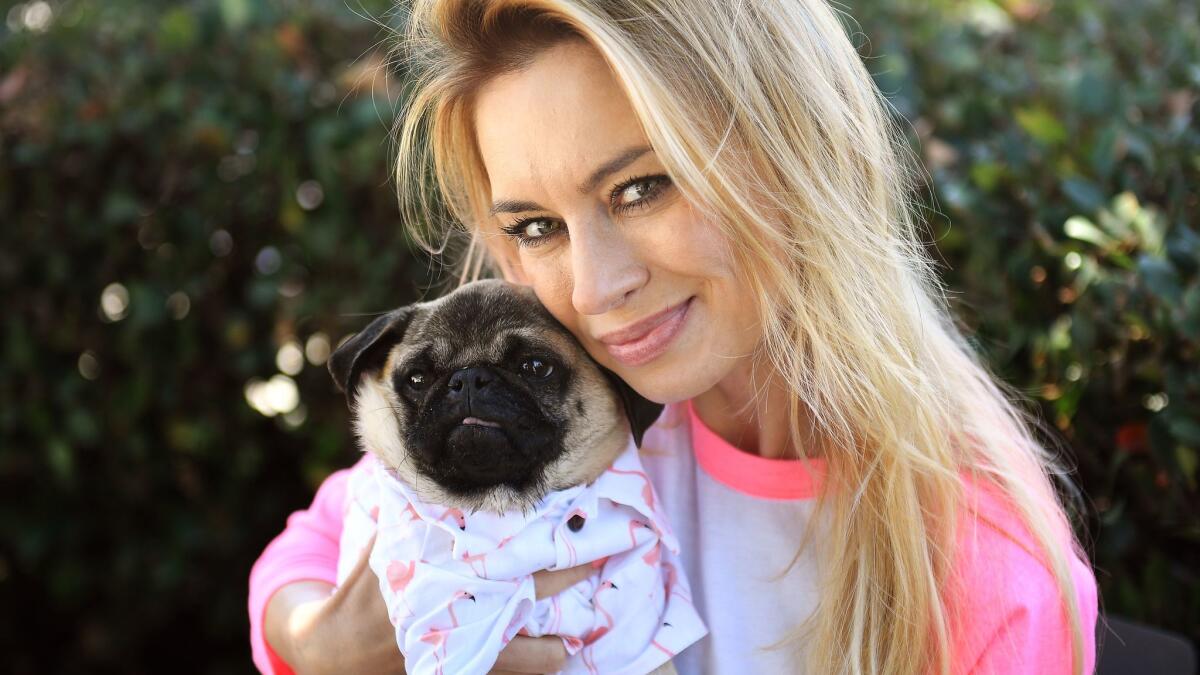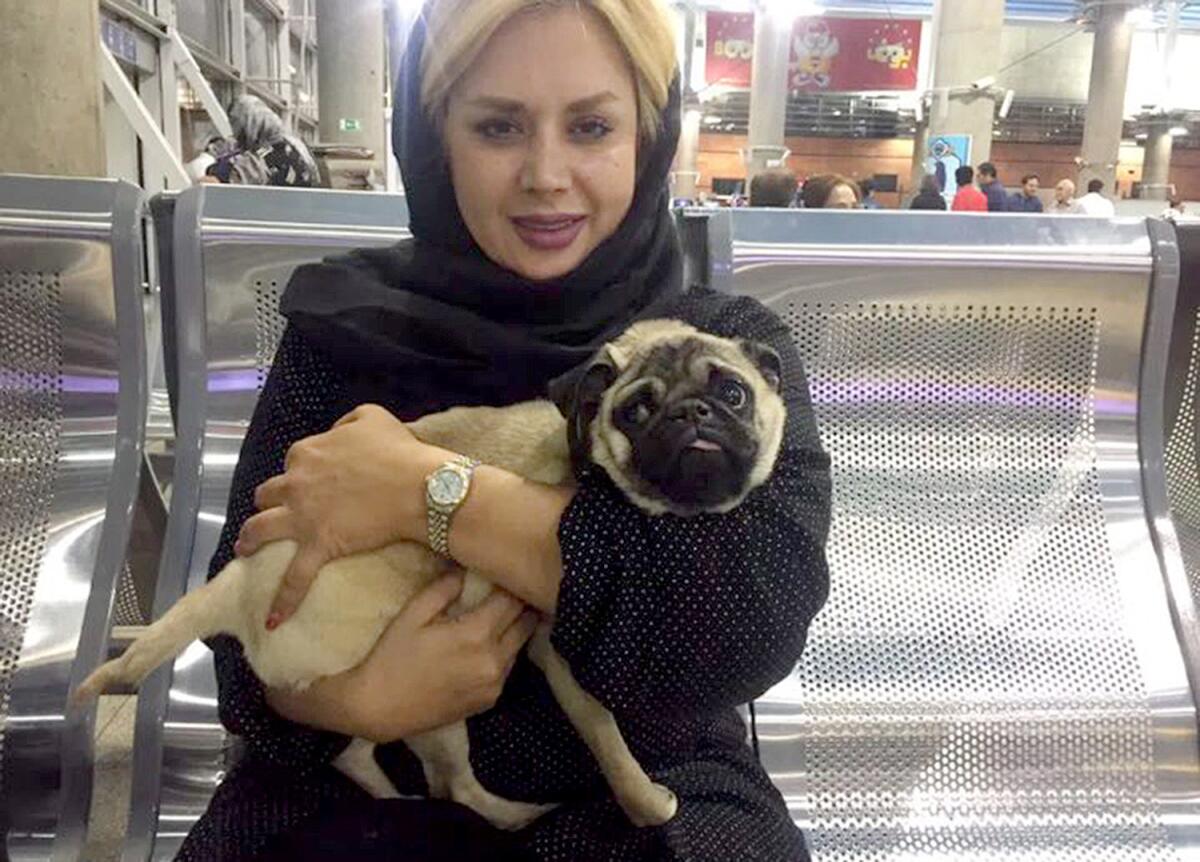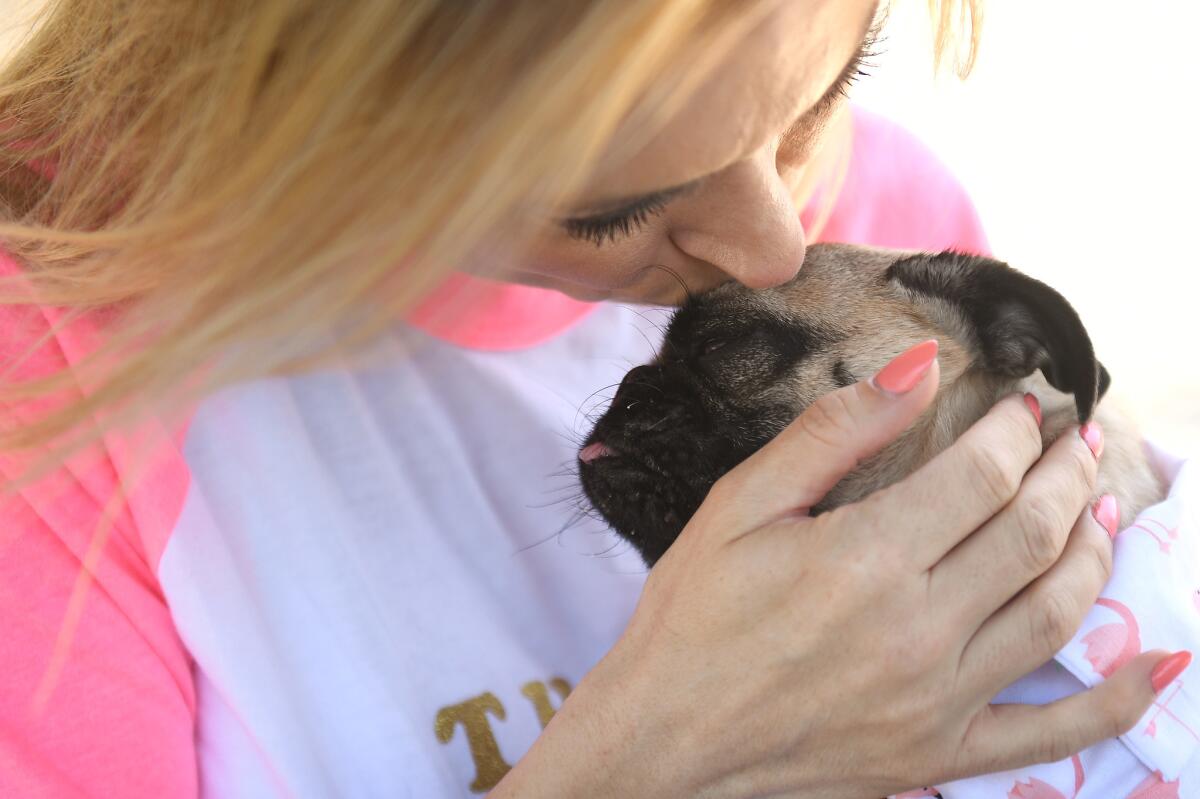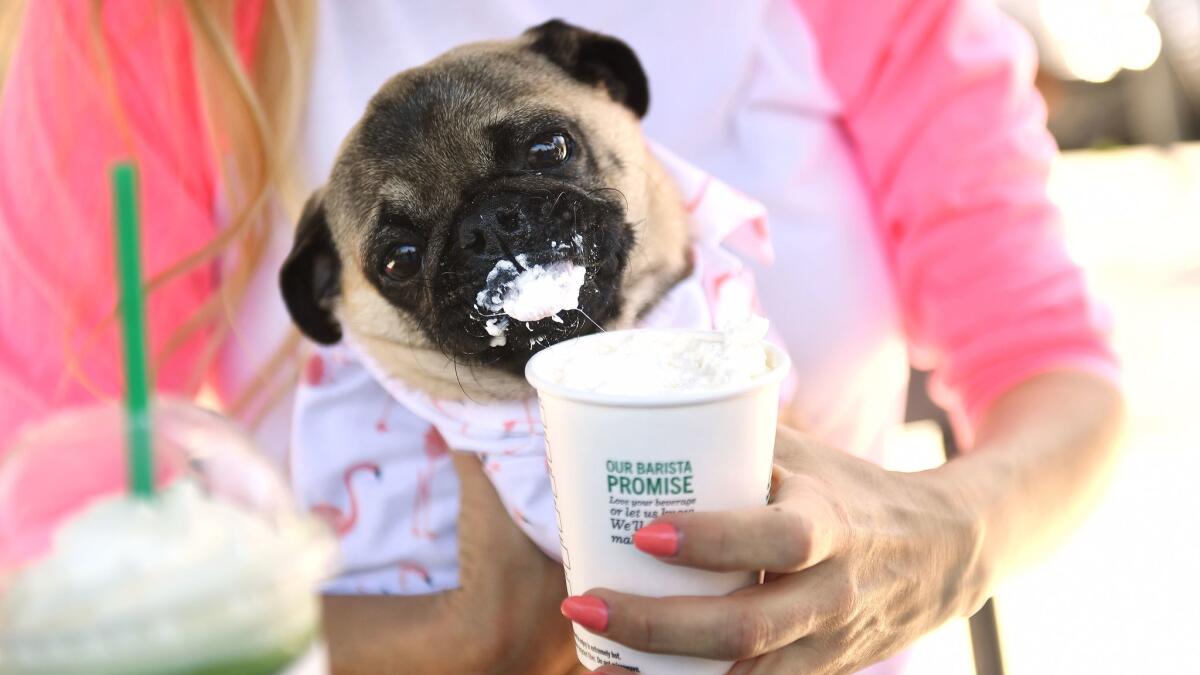‘A travel ban for a pug? I don’t think so!’ How an abused puppy made the trip from Iran to America

Katy Kargosha worried her in-and-out flight from Iran to Los Angeles might look a little sketchy.
She had left her home in New Orleans two days earlier and flown to Tehran, where she would spend only four hours — just long enough to pick up a severely disabled passenger before flying back to the United States.
Her passenger, frail and tired from the long trip, was a pug. Like him, Kargosha had once called Iran home. As her plane touched down at
“I was sure they were going to ask, ‘Why did you go to Iran for four hours?’” said Kargosha, a dual citizen of the U.S. and Iran. “I was worried I’d get in trouble. I was worried about the dog if they kept me for a thousand questions.”
The dog had been abandoned beside a Tehran highway and was now being escorted by Kargosha to Los Angeles — into the arms of The Pug Queen.
I was worried I'd get in trouble. I was worried about the dog if they kept me for a thousand questions.
— Katy Kargosha

As relations between the U.S. and Iranian governments have deteriorated during the Trump presidency, travelers increasingly have become pawns in the political tug of war amid talk of travel bans, sanctions and the nuclear agreement that Trump has called “the worst deal ever negotiated.”
Last week, the Supreme Court affirmed parts of President Trump’s travel ban involving six Muslim-majority countries, including Iran. Much narrower than the president’s original executive order, it would presumably not affect people who have “bona fide” connections in the U.S.
The ban went into effect Thursday night, drawing protesters and immigrant-rights attorneys to LAX to assess the impact on travelers.
Weeks before the Supreme Court’s decision, over Memorial Day weekend, Kargosha rushed to her homeland to get the dog on behalf of pug rescuer Izabella St. James. As a dual national, Kargosha can travel with relative ease, without the visa-processing delays and denials that have beset others.
The pug was whisked to the U.S. without a hitch. But the dog’s rescue, amid uncertainty about the ban, illustrated the anxiety that accompanies traveling to Iran in the Trump era.
In the current environment, the possibilities of complications are greater if the Iranian traveling to the U.S. is a human being, said Trita Parsi, president of the National Iranian American Council, which advocates for better U.S.-Iran relations.
“It’s astonishing that you have a greater chance of coming to the United States if you are a dog than if you are a relative of an American citizen,” Parsi said.
‘Here’s a challenge for you, Pug Queen’
The skinny, fawn-colored pug limped across a red Persian rug, his front legs splayed awkwardly in front of him, falling repeatedly. He’d been beaten.
In Iran, Islamic clerics view canines as unclean and symbolic of Western decadence. Conservative lawmakers have, in recent years, called for their owners to be lashed and pay steep fines.
Still, dog ownership appears to be growing among the country’s upper and middle classes. Videos of dog beatings and killings have gone viral on Iranian social media, prompting major protests and calls for laws that would punish animal abusers.
“Having a dog is a political protest of sorts,” said Alex Vatanka, a senior fellow at the Washington-based Middle East Institute. “It’s kind of like giving the finger to the regime.”
Kargosha, a dog lover whose own pug died recently, saw a video of the puppy’s tortured walk on Instagram, where she follows several Iranian animal rescuers. She sent a message full of crying emojis to The Pug Queen, whom she had never met: Did she think he could be helped?
St. James replied within seconds: “I will take this baby and get it help if it can be flown here!!! I will pay for the flight.”
It was Feb. 1. Five days after Trump issued his original travel ban.
Massive protests had erupted that weekend at LAX, where several Iranians with visas and green cards were among those detained by federal authorities after the ban was announced. Kargosha’s Persian acquaintances in the U.S. were canceling travel plans, afraid to leave the country.
St. James and Kargosha tried to find volunteers in Iran to bring the pug to the U.S. There were no takers.
“I was like, ‘Oh, Iran. Awesome. Here’s a challenge for you, Pug Queen,’” St. James said. “But if there’s a pug that needs to be rescued, everyone step out of my way. I’m not deterred by anything: time zones, politics, continents, religion, culture.”
If there's a pug that needs to be rescued, everyone step out of my way. I'm not deterred by anything.
— Izabella St. James

St. James, one of
As a child, she had to leave her dog behind when her family left communist Poland, and she always wanted another. She researched breeds while attending law school and loved the description of pugs: ornery, clever, goofy-looking. Hefner later bought her first pug, Balbina.
Followers of her prolific social media accounts — who crowdfund the rescues and the dogs’ myriad medical expenses — report to her when they find neglected pugs. She has shown up, unannounced, at the homes of backyard breeders in the Inland Empire, given them cash and taken their dogs.
The Iranian pug was her biggest challenge.
“A travel ban for a pug?” she said. “I don’t think so!”
A life of abuse
The pug, who is now about a year old, had suffered his whole life, said St. James and Kargosha, who pieced together his history from Iranian animal rescuers.
He urinated on his owners’ rug as a puppy, and was kicked so hard his neck was nearly broken and his spine damaged, hobbling his ability to walk properly, St. James said. A visitor to the family’s home contacted a local dog rescuer, who took him in.
The pug’s story spread over Iranian social media, which is how Kargosha learned of him.
As St. James and Kargosha were trying to figure out how to get him to the U.S., the rescuer found a surgeon to operate on the dog’s neck, and an Iranian family offered to pay and foster him while he healed, St. James said. But the surgery, she said, made his injuries worse. He lost all use of his front legs.
Then, the dog of the family caring for him had its own medical expenses, and the family couldn’t care for the pug. They returned him to his original owners, who left him on the side of the road with no food or water, St. James said.
Two days after he was abandoned, some Iranians who feed stray cats spotted him and scooped him up.
A complicated journey
For Iranian Americans, much of the hope for better relations and easier travel after the implementation last January of a nuclear accord between the U.S. and Iran has been tempered by the recent arrests in Iran of dual citizens, some of whom received lengthy prison sentences, and by Trump’s travel ban.
Parsi, with the National Iranian American Council, said the number of visa applications by Americans wanting to visit Iran “dramatically increased” after the nuclear deal was struck but is now down more than 50% compared with last year.
For Iranians wishing to visit the U.S., the visa process is expensive and can take months. Because there is no U.S. embassy in Iran, they must travel to one in a third country — such as the United Arab Emirates, Armenia or Turkey — to apply for a visa, go through a lengthy screening process, then return to the third country to have their passports stamped.
But many dual nationals, like Kargosha, who goes to Iran annually to visit family, have traveled back and forth for years without incident.
Within a week of learning the pug had been abandoned, Kargosha flew to Tehran. Despite her nerves about landing in L.A., Kargosha and the dog had no problems.
An American welcome
Kargosha and the pug were greeted at LAX by admirers waving American flags and holding a sign: “Welcome Puggy!”
The dog St. James hoisted up, weeping, was deathly thin, just 8 pounds, with convulsing front legs. He couldn’t move his neck and could only drink water through a syringe.

On a recent afternoon, St. James, wearing a shirt with “Pug Queen” in gold letters, brought him to a Brentwood Starbucks. He lapped up a “Puppaccino,” a cup full of whipped cream. Because he now is a hip Angeleno, she said, he was wearing a polo shirt emblazoned with flamingos.
St. James cooed at him in Persian: “Salam!” Hello. His ears perked up.
Days later, he would undergo a risky surgery to realign his spine and to remove a wire left behind in the Iranian surgery. Maybe, one day, he’ll walk again.
St. James asked her followers to name him. They chose Chance because this was his.
ALSO
New Jersey Gov. Chris Christie's beach visit during budget crisis steams residents
Hiroshi Miyamura and his hometown had a lot in common. They believed in America.
Vice President Mike Pence stays loyal to Trump, but it could come at a cost
Sign up for Essential California
The most important California stories and recommendations in your inbox every morning.
You may occasionally receive promotional content from the Los Angeles Times.








